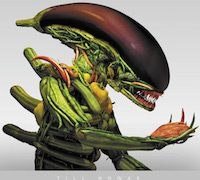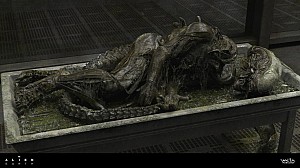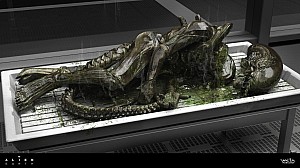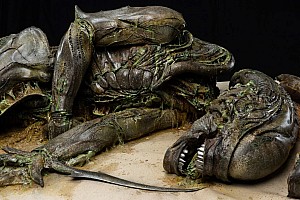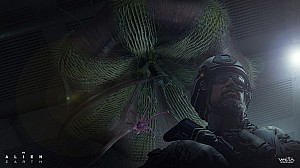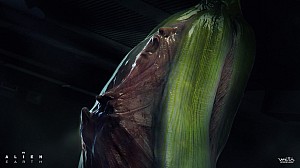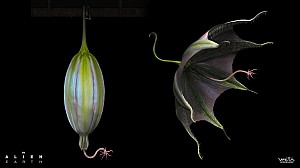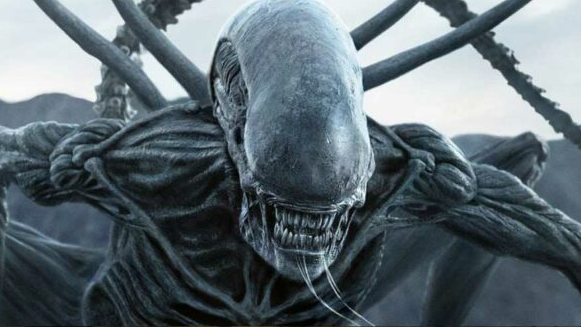Alien screenwriter speaks his mind - By Ed Sunden II, Fantastic Films.

FF: You got a new movie coming out - ALIEN.
O' Bannon: Right.
FF: And you went through all kinds of hassle and trouble with it.
O' Bannon: Yeah. I wrote the first half of Alien in 1972. I was looking through my notes, I've kept a running journal for about the last ten years. At the time I'd written the first half of it but I didn't have a title for it. Back then we were still working on Dark Star, the picture derives some elements from Dark Star. It was like, while we were in the midst of doing Dark Star i had a secondary thought on it - same movie, but in a completely different light.
FF:Why didn't you direct it?
O' Bannon: I was going to, but my partner Ron Shusett, wanted to go to the studios, and with the studios, there was no way back. Back in '76, I had hit a really bad career situation...
FF: Ron Cobb was telling me you were sleeping on Shusett's couch.
O' Bannon: Yeah, right, that was when Dune fell through. And incidentally, I that Dino Delorentis now has picked up Dune, but I bet it won't be the same picture that Jodorowsky was going to make. So, there I was on his sofa, didn't have any prospects at all. It was a terrible situation; I couldn't stay on his sofa indefinitely so, I hauled myself up out of black depression and was going to do something - I'm going to write a script. And after haggling over it a little while, Ron and I agreed to do something together. I said, "I've got a great first half of a script and I've never known what the second half of it was," and i gave it to him and he read it and he thought about it and said "You had another idea for a film, and it wasn't a science fiction, it wasn't a space movie." It was an idea about as movie called "Gremlins," about a B-17 bomber bombing Tokyo on a bombing mission at night though a thunderstorm. Now on the way back , it's several hours flight back to their Pacific Island base, Gremlins get onto the aeroplane. And they have to fight these things off. He said "Why don't you make that the second half? Put it in the Spaceship?" And I said "Yeah, that would work. That's good, that's great. And so we talked the story out, and I wrote it for a period of about three months with continual discussions and me pounding away on the typewriter....and I wrote it because I planned to direct it. I wanted to do it for about half a million. I was done, Ron wanted to go and try the studios. Well, he did, and it worked the first shot out. And that was it as far as me directing it.
FF: Who was it taken to, Brandywine?
O' Bannon: It was taken to Brandywine Productions by a fellow named Mark Haggard; Ronnie Shusett made a finder's agreement with him. A finder's agreement means that if he finances a movie, he gets a certain agreed upon sum. Haggard knew Walter Hill and he took it to Walter's company Brandywine, which was Walter Hill and Gordon Carroll and David Giler. They read it, they called us in and Gordon said to us, "We've read 300 scripts and this is the first one we've all agreed on." Okay? great compliment. And they proceeded to make a deal with us. And we got into a lot of haggling, there was at least a month of negotiating. Finally, we made a deal, an option deal, and they took it to Fox with whom they'd just made some kind of production arrangement for their company. And Fox immediately expressed interest and Brandywine exercised the option which was a real surprise 'cause it was the first time in my life I'd ever had an option exercised. I'd sold many options but I'd always had them revert. I'd never had them fork over the cash on the barrel head.
FF: Typical. Happens all the time.
O' Bannon: What happens?
FF: Options reverting. You realise that probably half of everything that Heinlein has ever written has at one time or another been optioned, and with the exception of one story, it's always been reverted.
O' Bannon: Well, this one didn't revert. They'd paid us wham!-landslide! - cash! It was interesting because it came just in time to pay me medical expenses. I'd been under much stress and other problems plus not taking care of myself, that I came down with a very bad stomach ailment in 1977. I was sick a great deal of that year I was in and out of the hospital. Then Fox hired me, they out me on a salary to go in and design the whole movies. So, I hired Ron Cobb and i asked for Chris Foss who was in England and they actually hired him and flew him over.
FF: You'd worked with Foss on the Dune project?
O' Bannon: Yeah. And I tried to get Cobb on to Dune, but it never worked out. So, I felt a debt of honour to Cobb because there Ron was with his bags packed on my word and it never happened. So, I felt real upset about that, and I felt like I owed him one, and so i really wafted to make sure he was on Alien. But of course that was hardly the principle reason, the principle reason is because he's so good. You know, Ron Cobb gave continual input to the film right from the very start. He gave us one of the major plot elements , the monster has an incredibly corrosive bloodstream, one of the reasons the monster can't be cut up or fired at is because it's blood would eat right through the ship. That was Ron's idea and I want everyone to know it.
FF: I think we both agree Ron's incredible!
O' Bannon: And I got them both, and we spent the whole summer in some little offices there designing it.
FF: You spent seven moths designing before they found a director for it?
O' Bannon: No. They had a director - Walter Hill. Hill was scheduled from the beginning to direct the picture. But finally in the summer of '77 he withdrew from directing Alien to go do the driver instead. He preferred to do the driver. And that then left them without a director.
FF: So they got Ridley Scott?
O' Bannon: No. It didn;t happen like that quickly. Gordon had to go out and look for other directors and the very moment he started to look the Director Guild went on strike. They were on strike for several months. All we could try to do was get some preliminaries out so when the strike was settled, maybe then Gordon could make some More moves. When it was all over Fox said, "Here." They handed Brandywine a list. And Ridley was at the top of the list and they said, "Pick one." So they took the first one. I remember getting this call from Gordon Carroll. He said, "You must meet Ridley. You're going to like him." I was really skeptical because we'd had a difficult time even at that point. I went in, and there he was. Ronnie Shusett had feverishly rushed up to him and shoved a copy of the original draft of the script into his hands because Hill and Giler had begun to rewrite it. We were disturbed by the content of the rewrite. Ridley read it and went "Oh yes. We have to go back to the first way. Definitely." So it was Giler and Hill's turn to be disturbed. As a result, the entire remainder of the production became a battle between camps. One camp wanting one Verizon of the film and another camp wanting the other Verizon.
O' Bannon: Yes, inextricably involved, right. And boy, believe me, I was inextricably involved, because if there was any way they could of me out of their hair they would have. 'Cause I was such a Thorn in their side. I remember being faced with what i call a moral decision. My agent, my manager, and everybody else was starting to go over to England to start working on the film proper, and they said, "Be sure not to antagonize anybody 'cause they're so important, it's your first project and it's a major studio, every body's relying on you to be friends." I got over there and I found that the confusion was so great and the babble of voices was so loud that I couldn't make myself heard without being obnoxious. I couldn't make an impact and there were things I felt so strongly about that I wanted to have heard. I wanted to win points, certain points I felt very strongly about. So, I finally decided, "All right, I'm going to go against the good advice for my career; I'm going to fight." And my reasoning was, in 40 years I'd still be able to sleep with myself. That I wouldn't look back and say "You know, there's Alien and it stinks and if i had fought, maybe it wouldn't." And I looked forward to that in my own frame of mind. And I decided, "All right, I'll fight," even though that it's tactically the wrong thing to do.
There are inspirations for Alien - I had a lot of second thoughts about Dark Star, that was one of them. Well, another source was that I met Giger when we were working on Dune, and I'd looked at his picture books and when I got back to America I was still haunted by his work. It was on my mind and when we sat down to do Alien I ended up visualising the thing as I was writing it, as we were thinking it out and I was writing it. I found myself visualising it as a Giger painting. And I wrote this script. But then I was thinking of a half a million dollar picture done here in L.A. There would be no money to either import this guy or pay him. So at first I thought I would have Cobb doing that monster - he's quite superb - it just didn't happen to be any of his (Cobb's) monsters that I landed upon in my head when I was thinking about the script. Well when they started to do it the big way, the first guy I started pushing at them to do the monster was Giger. I had a heck of a time trying to get the producers to hire Giger. They really didn;t want to get involved because he's not a movie professional, he was some "whing-ding"," in Zurich. They wanted to find somebody who had done this before, that they could count on.
Well, when Ridley came to the project; while Ronnie was rushing up with the original draft of the script i was rushing up with copies of Giger's work. Ridley saw Giger's stuff he was snowed. He said, "This is it!" I really won some of the very major things that I had planned in the beginning, some of the very broad strokes. I had a vision right on this very sofa, of a Giger monster around which a science fiction horror movies based and it ended up happening. In fact, the design they ended up getting, almost by coincidence, I had settled on in my own mind. One of Giger's designs i liked and wanted to see as the monster. Later on, Ridley went through Giger's work and he found a different source of inspiration and he had Giger design it from that. But the funny thing was when it got done - when Giger ended up adapting it and designing it and shaping it up - it ended up being similar to the thing that I Had in mind that I never mentioned. I was just so happy to get Giger that anything he did was fine by me.
When you start thinking back, I said, "You know, it's amazing. Damn it. it's even similar to the one I'd been thinking of." There's a head distortion on the creature and the one I wanted, distorted the head toward the front. The one that Ridley picked distorted the head out towards the back, they're the same family...
FF: I'm told that Giger built the monster himself.
O' Bannon: He sure did! He had expert help because there are some crafts involved that I don't think that Giger had done, like casting it in rubber materials. But he's quite a craftsman, actually.It was an amazing sight. Giger fixes himself up to look like Dracula, he wears black leather, he has black hair, black eyes, and pale complexion, he never takes off his coat, his black leather jacket, and he had them set him up, built him a little sculpting studio in the corner of one of the sound stages with a padlock on it where he could work.
He wanted clay, and basic sculpting materials and he also wanted bones as many bones as they could lay their hands on. They ended up buying all this stuff, veterinary supplies, medical supplies, and the little sculpting studio turned into a bone yard. They got him a rhinoceros skull, three of the most perfect human skulls I've ever seen in my life. They were beauties, they must have borrowed them off a living person top get them, that perfect, every tooth was intact, not a filling. I think hey cost something like $700 each, they were so prim. He had snake skeletons in perfect preservation, they looked like lace. And junk too, just old smelly bones out of a slaughterhouse and he just started sculpting.
The first thing Ridley did is he had contortionists tie themselves in every possible knot and walk around to see if they could build a costume around. And he had three contortionists tie themselves together and walk around. He finally concluded that it was just too awkward. Finally, he bought this big expensive picture book on some part of Africa, it was photographs of some of the remaining native tribe that has somewhat primitive lifestyle. There were all these really striking colour photographs and this particular tribe has a striking appearance. They're all very tall and very black and there were some very, very impressive photographs of these tall, thin powerful-looking men with very supple, gleaming muscles. They're very graceful, sort of sensual, and at the same time powerful and handsome, but almost ethereal, almost not human - very striking.
That image burned itself into Ridley's brain, he liked that power of unearthliness and grace and strength. he wanted Giger to see if he could do something around that kind of shape of a person. Then they found their actor who is this seven-foot-African...
FF: So the monster was actually designed for one person rather than with a visual image of a particular type of human in mind?
O' Bannon: No. more along these pictures out of this book more of this Nubian black racial type. The thing we liked so much was the grace of these black people. Giger then came in, and Giger has a feel for grace, but a different kind of grace. Giger loved grotesquely. So Giger started building up around this graceful figure, his pipes and tubes and running, rotting sores and joints and pustules and strange shapes and building it up and came up with something most bizarre. The plaster shop took a full cast of the actor, full body cast and mounted it standing up on its toes on a wooden base and Giger put it into his studio and he began to build up on it with clay and bones, an air conditioning duct, screws, and human skulls - the face of the thing is a real human skull. He took the skull and jammed it right on the front, riveted it in place, and then started modifying it.
It was such a beautiful human skull, you know, it had been a real person, not like one of those plastic model kits - and he takes out his hacksaw and he saws the jawbone off and extends the jawbone, like six inches, puts and extension on in it, and creates this distorted jawbone!. Then he starts to attach other fixtures to it and building a new extension on the back of it. He's doing this to a real human skull! When he finally got all done they took a cast of it, it was a craftsman who actually cast the rubber costume of Giger's sculpture. When they were finished casting in rubber he used his airbrush and painted the costume the same way he paints his paintings.
FF: Sounds hairy.
O' Bannon: It's terrific. I've really got my fingers crossed. I truly believe that that monster in Alien is absolutely unique looking. I think that it is two strides beyond any monster costume in any movie ever before. And some of them are goodies, like the creature from The Black Lagoon, or This Island Earth, the bug with the exposed brain, some of those were terrific. I really think this is a step beyond. I don't think that any body's seen anything like this.
FF: Was the original grace of the actor maintained? That image?
O' Bannon: Well, oh, that image, yes.
FF: Wasn't to clouded by Gigers...
O' Bannon: No, no. Definitely, Giger has a very very graceful line too. No,definitely that thing was very supple looking. Unfortunately, the real grace was lost, because the suit proved to be very awkward to move it. The actor wasn't able to make many moves in a graceful manner. Ridley was forced to stage around the physical awkwardness of it. But the visual appearance of power and grace was retained, quite striking.
FF: Ron said that during some of the dallies, especially during some of the bloody sequences. People who had been working on the film were dumbfounded.
O' Bannon: It didn't bother me (laughs)
FF: What I'm getting at is, from a prurient interest I hear it's pretty bloody and gory and...when you see a set and all the technicians are in coveralls and the cameras are covered in plastic...there has to be something going on.
O' Bannon: That was great. The day that hey shot that I revered myself a box seat. I went to the set very early in the morning and I looked around where they had the cameras placed, and I picked the best possible spot for myself where I'd be out the way and i sat there and didn't move.
There was a pretty big audience for that shooting, a lot of people involved in the film came and looked on and just basically stayed and waited. A lot of people were interested. Fox had been giving Ridley a lot of hassle because he had gotten a slow start, the first couple of weeks of shooting were slow, they were jumping all over. The reason they were slow was because they had allowed inadequate time to design and build the sets, and on the first day of shooting no single set was fully completed so Ridley had to shoot around the sets for a couple of weeks. And they still jumped all over him, they said he was too slow.
So fairly early in the shooting they got to that scene, a very bloody scene, I'd appreciate it if you wouldn't actually give the point away in the interview, you know, allude to it without letting them know what's going to happen. You know what scene we're talking about?
FF: it hasn't been described.
O' Bannon: Good. Okay, I thought you knew about it. Well, I'm going to stay vague 'cause i want to allude to it but I don't want anybody to know exactly what it is until they see it.
FF: Sure
O' Bannon: For obvious reasons. I want the audience to get it straight in the face without any preparation. And the producers want to keep it quiet but for what I think is a somewhat pettier reason. They don't want it stolen for TV. I just want the audience to get it fresh. I don;t want it getting out in advance. But I was there watching that thing and at a time when Fox was putting enormous pressure on him for being too slow, he took an entire day to film one short sequence. I was there and they had three cameras set up 'cause they wanted to catch it from all angles and all the cameras were covered in clear plastic tarps. The lenses were covered with flat optical class like underwater cameras and Ridley and the D.P. and all of the technicians were all wearing overalls up to their necks. It took them three to four hours to get the actor doing to do the stunt rigged because there was mechanical stuff involved.
Meanwhile the other actors didn't come on set , i don't know where they were, they had a room where the actors could hang out and talk to each other. Then they brought them in when they were ready for it, they haddn't seen all the preparation. all they did was they walked on, they saw all these tarps, and they saw huge hydraulic machines with hoses leading the this rigged man, and they saw everybody wearing coveralls. I looked at Sigourney Weaver, whose the lead, I saw her face as she looked at the tarp, coveralls and camera, and she seemed to go a little shaky. The actors looked real uneasy when they saw the set-up because it looked like they were trying to prepare for Vesuvius.
I don't even know if they're going to leave it in the picture. I understand they're getting a little chickenhearted in the cut. But eh amount of blood was just unparalleled. I saw Veronica Cartwright get drenched from head to toe in blood and scream her fool head off and fall backwards over a table and brained herself.
FF: What were they using?
O' Bannon: I don't know, artificial blood, not real blood. Then afterwards these two people pick Veronica Cartwright up and she was weak kneed and they had to help her off the set. She was drenched, all her clothes sticking to her, and her hair sticking to her with this red dye and she was near hysterics. And 20 minutes later they come back and they had showered her and fixed her up and put a duplicate costume on her and she looked the same., but a little spooked, and i went up to her and i said, "That was really terrific. Was that all acting?" And she looked at and said in a kind of spooked voice "Well, i was a little freaked-out." I just saw her in Body Snatchers, they just released it, i hadn't been able to see it even though she did it before she did Alien. She was one of the best people in Body Snatchers.
FF: Have you seen a final cut of the film?
O' Bannon: No, not yet.
FF: Do you think, for everything that you've seen of the post production work and the dallies to this point, that it's your film? Is it the way you wanted it?
O' Bannon: No.
FF: What was significantly changed, what was changed to your dismay?
O' Bannon: Everything.
FF: Can you start with a couple of little things? Can you point them out?
O' Bannon: They dropped a major plot element out of the script.
FF: Can you elaborate?
O' Bannon: In the movie, the Earth men discover a wrecked, derelict spacecraft. Actually no, that's not correct. In the movie, the men discover a wrecked construction of non-human manufacture and inside of it they find eggs of the monster. In the original script the men find a crashed derelict spacecraft and they enter it; they discover that the alien crew are all dead. They return to their own ship to contemplate what may have killed the alien crew and then they discover a pyramid on the planet which appears to be indigenous and primitive. They enter the pyramid and there they find the eggs. They combined these two elements, they squeezes them together into one sort of uneasy entity.
FF: The idea behind that, i would assume that the dangerous aliens were coming back to spawn or something?
O' Bannon: No, they were two different races. In my script, it was a space going race that landed on the planet and had been wiped out by whatever was there. And now the Earth men come and they endanger themselves in the same way. In the new version it's just sort of a surrealist mystery.
FF: And what ever they find there in the alien construct is the alien menace?
O' Bannon: Yes. So they combined, and they did dome things...and there were some changes that were better. There were some improvements made.
FF: In what direction?
O' Bannon: I think they made some of the characters cuter than they were. Some of the dialogue is definitely snappier than it was in the original draft. I think a lot of the designs that Ridley supervised differed because his visual hand is very strong over the surface of the picture. I think may things like that changed. You asked if it was my film. And i said no. And you said, can you name one of the things that disturbs you, well not every way in which it is different disturbs me.
FF: A lot of them okay?
O' Bannon: Ridley has this lavish, sensual visual style; and i think that Ridley is one of the 'good guys.' I really think that he is-was the final pivot point responsible for the picture coming out good. And so a lot of the visual design and a lot of the mood elements inherent in the camerawork, while they're not what i planned, are great. They're just different. Also, it's not 100% Ridley either. It's Ridley superimposing his vision over the cumulative vision of others, you see. Now this could be such a strong director's picture because Ridley's directorial and visual hand is so strong. There will probably be tendency among critics to refer to it as Ridley Scott's vision of the future. And he did have a vision of the future. But it was everybody else that came before, that's what his vision is.
FF: Basically, Cobb and Foss and Giger and you...
O' Bannon: And Ronnie Shusett. And if it sounds like I'm knocking Ridley I'm not.
FF: No-no, it sounds very complimentary. What's the next project?
O' Bannon: I'm writing a novel called They Bite.
FF: Why not another film?
O' Bannon: I may write another script, to direct myself, but I'm never going to get into hassle i got into Alien. It's amazing. Back in September or last year i started negotiating and hassling for my screen credit. Giler and Hill wanted credits to read; Screenplay by Walter Hill and David Giler based on a screenplay by Dan O' Bannon from a story by O'bannon and Shusett. They didn;t shoot the Giler and Hill rewrite, Ridley shot my script.
So, I took it to the writer Guild for arbitration. On a Friday I get this call from the WGA telling me that they've decided in my favour. Then in the next breath, they tell me Hill had immediately submitted an appeal of that decision. Finally, after months and months of hassle, the WGA has decided and the writing credit will read: A screenplay by Dan O' Bannon from a story by Dan O' Bannon and Ron Shusett. I've been vindicated. I still don't know about my design credit but we'll see. The problem with the money-men is that a lot of them don't care about making good films, and don't understand movies, yet they insist that you do it their way....
FF: Well, I just hope that the released version of the movie pleases you.
O' Bannon: Me too.

David Giler: Cinefantastique Interview
David Giler, who wrote scripts for MYRA BRECKINRIDGE, THE PARALLAX VIEW and FUN WITH DICK AND JANE, always seemed to get his office located down the h...

David Giler Alien 3 Starburst Special Interview October 1992
Alien 3 screenwriter David Giler guides us on the terrifying journey from script to screen. Why was there a third Alien movie? What were all the re-wr...

Did Alien 3 rip-off The Element of Crime?
In 1984, Danish filmmaker Lars von Trier (Melancholia, Dogville) began his directorial career with The Element of Crime, his first feature film. ...


